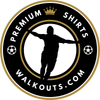Derby County Football Club, based in Derby, compete in the Championship, and fans can discover signed shirts and framed pieces at Walkouts. The club was founded on 5 February 1884 by William Morley as an offshoot of Derbyshire County Cricket Club, and it remains one of the 12 founder members of the Football League.
Hailing from Derby, the team currently play in the Championship. Their competitive peak arrived in the 1970s when they secured two First Division titles, and they also reached the European Cup semi-finals during that era, achievements that shaped the modern collectors market for Rams shirts.
Across the interwar years and into the post-war period the club built a distinct identity, lifting the first FA Cup after the Second World War and contesting league honours in the 1930s. Black and white have been the home colours since the 1890s, and the East Midlands derby with Nottingham Forest is a recurring provenance cue for derby-worn shirts and match photographs.
Collectors note a post-1970 anniversary release in 2009, when Derby marked 125 years with a commemorative crest, a release that often appears in framed retail sets and special edition runs tied to the club’s heritage.
Season-specific shirts are especially sought after, notably the title-winning campaigns of the early 1970s and subsequent European nights. Shirts from the Clough era and the 1972-73 European Cup run attract attention for match provenance, while later promotion seasons and 1995-96 retail releases are chased for player-issue variants. Fans also collect signed fanshop shirts, not only match-worn pieces, with early runs, player-issue variants and region-specific releases carrying particular demand; supply eras such as Umbro, Admiral and Kappa are often used to date retail items.
Iconic away colourways matter to provenance specialists, for example the 1972-73 European away nights that introduced a distinctive sky blue shirt worn on the continent, and shirts from the era are often photo-matched to specific fixtures. That same early-70s period, including 1971-72, is commonly referenced by collectors when verifying stitch patterns and wash tags against archive photography.
Provenance is key and many retail items are offered with authentication so collectors can trace release history, notably the commemorative 125th anniversary release of 2009, and documented pieces may come with a COA. For those seeking framed or signed retail shirts from the club’s golden seasons such as 1971-72 and 1974-75, Walkouts lists verified items alongside condition notes and historical context to aid selection.







